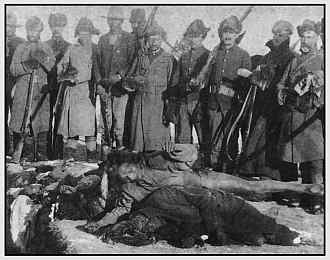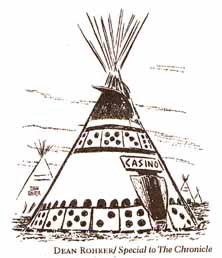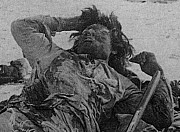
 Another Stereotype of the Month entry:
Another Stereotype of the Month entry:

 Another Stereotype of the Month entry:
Another Stereotype of the Month entry:
Published on Wednesday, April 20, 2005
Sept. Remarks Resurface
Summers releases transcipt of controversial speech on Native Americans
By DANIEL J. HEMEL
Crimson Staff Writer
University President Lawrence H. Summers yesterday released the transcript of remarks he delivered to a September 2004 conference on Native American studies at Harvard, after several scholars who attended the event told The Crimson in interviews this week that they had been deeply offended by the speech.
The flap over Summers' September remarks surfaced last Friday when the Washington Post—in a lengthy profile of the embattled University president—quoted two attendees who said that Summers' speech had devalued the historic suffering of Native Americans.
But in an interview at his Mass. Hall office yesterday afternoon, Summers said, "I did not mean for a moment to diminish the severity or ferocity of the widespread violence that claimed very many [Native American] lives."
"My aim was to point to the need for conscious efforts at Harvard and in the nation more broadly to contribute to the prosperity and health of Native American communities. I regret if my remarks were understood otherwise," Summers said.
Still, several scholars came away from the September conference, a two-day event that drew some of the most prominent figures in the field of Native American studies to the Barker Center, with the impression that Summers' comments had been painfully insensitive.
Summers' remarks were "quite problematic," said Kay K. Shelemay, Watts professor of music at Harvard and a member of the Committee on Ethnic Studies, which sponsored the September symposium, titled "On Our Own Ground: Mapping Indigeneity within the Academy."
University of Michigan historian Philip J. Deloria, who delivered the keynote address at the conference, wrote in an e-mail to The Crimson yesterday that he found the president's remarks to be "a bit odd."
"I was not particularly offended, but I can imagine that some people may have been," Deloria wrote.
Even seven months after the conference, several scholars who attended the event are still incensed by the president's remarks.
Michael Yellow Bird, director of the Center for Indigenous Nations Studies at the University of Kansas, said that Summers' remarks were "really, really insulting."
Tara Browner, associate professor of ethnomusicology and American Indian studies at UCLA, wrote in an e-mail to The Crimson Sunday that she and several other attendees were "appalled" by Summers' statements.
"What Larry Summers said, and this is an *exact quote*, was that ‘The genocide of American Indians was coincidental.' As in it was an accidental by-product of Western European and Euro-American expansion," Browner wrote.
But the word "genocide" appears nowhere in the two-and-a-half page transcript released yesterday by the president's office.
"I have a memory of ‘genocide,' but that could have been someone afterwards repeating his words," Browner said in an interview last night.
However, after The Crimson read the transcript to Browner, she said that Summers' remarks were "essentially" just as offensive as she recalled.
C. Matthew Snipp, chair of Native American studies at Stanford University, told The Crimson in an interview last night that "the transcript sounds considerably less obnoxious and more innocuous than the actual talk."
"But if that's the transcript, that's the transcript...I'm as puzzled as anybody now," said Snipp, who was a visiting professor in Harvard's sociology department last academic year.
Shelemay, who reviewed a DVD of Summers' speech recorded by the Committee on Ethnic Studies, confirmed that the transcript was an authentic rendering of Summers' remarks.
"I am very glad that he released the transcript," Shelemay said. "It corresponds to my notes," she added.
At press time, Summers' remarks had not been posted alongside other speeches on his official website.
‘A SENSE OF DEPENDENCY'
Several scholars who attended the September conference said they found Summers' behavior at the event to be "condescending."
"Summers was 15 minutes late and totally unprepared," Browner wrote in her Sunday e-mail. "He didn't even have little note cards in hand, and he just started speaking off the cuff."

Early in his remarks, according to the transcript, Summers cited a Harvard School of Public Health study revealing that in one Native American community in South Dakota, life expectancy is lower than in Bangladesh. Persistent poverty among indigenous communities in the United States, he said, is "a major area of concern." Summers noted that he and his colleagues in the Clinton administration's Treasury Department "worked hard and, I think, with some success," to make loans more readily available to Native American communities.
Just sentences later, however, Summers irked several listeners when he asked: "[H]ow does one avoid what I don't think is good for anybody, which is a sense of dependency on the larger society, a reliance on financial transfers from the outside, a view in terms of special programs that have an aspect of charity and response to charity?"
That remark was "misinformed and unenlightened," said Yellow Bird, the University of Kansas faculty member.
According to Yellow Bird, the word "dependency" is an incorrect description of Native American communities' relationship to the federal government. Rather, Yellow Bird said, the U.S. owes tribes hundreds of billions of dollars under treaties that have largely been abrogated by federal officials.
"[Summers] made it sound like we're just being beggars out there," Yellow Bird said.
Speaking to The Crimson yesterday, Summers further clarified his comments.
"The overarching point of my remarks was to express a concern about the well-being of Native Americans today: how to increase life expectancy, reduce poverty, and to do so in the best way given the distinctive historical relationship between Native American communities and the larger society," he said.
‘NOBODY'S PLAN'
The next section of Summers' speech—in which he commented on the demographic history of North America—sparked the most uproar among attendees.
"[W]hat actually comes out if you study it, and I think this is a relatively established fact, is that for everyone who was killed or maimed in some attack by European-descended Americans on the Native American population, for every conscious death that came in war, 10 were a consequence of the diseases that came to North America with European immigrants," Summers said.
He noted that in some instances, colonists intentionally infected Native Americans with smallpox. "But the vast majority of the suffering that was visited on the Native American population as the Europeans came was not a plan or an attack," Summers said in the speech. "It was in many ways a coincidence...Nobody's plan."
Summers said yesterday that he based the remark on several works of demographic history, including UCLA geographer Jared Diamond's Pulitzer Prize-winning 1997 book, "Guns, Germs, and Steel."
"Far more Native Americans died in bed from Eurasian germs than on the battlefield from European guns and swords," Diamond writes.
When The Crimson told Shelemay last night that Summers had cited Diamond's work, she exclaimed, "Oh my goodness."
"This is not a nuanced source on Native American history," Shelemay said.
Snipp, the Stanford sociologist, said yesterday that Summers' claim—that many more indigenous people died from disease than from direct combat—is "factually correct."
But Yellow Bird said that Summers' comment downplayed the culpability of settlers and U.S. officials who engaged in coordinated campaigns of genocide against indigenous groups.
"The point is that you don't minimize people's lives and their deaths by creating some kind of apologist stance for colonialism," Yellow Bird said.
In an interview yesterday, Summers said that "the horror of war is in no way diminished by the concurrent incidence of deaths from disease."
"I was attempting to make the point from a policy perspective that tragedies happen both as a consequence of malice and because of accidents and inattention," Summers said.
But several attendees had a different interpretation of the president's statements.
"I may be missing some kind of semantic shading on all of this, but it does seem to me that this helps perpetuate a myth of American innocence," said Robert Warrior, an associate professor of English at the University of Oklahoma who attended the conference.
Rob's reply
Summers made two stereotypical claims: that Indians suffer from "dependency" and that their deaths were a "coincidence." Let's take each in turn.
Yes, tribes receive government services in exchange for the land taken from them. But who says that makes them dependent? Like every American who receives government services, which means everyone, they're also doing things on their own. They're getting jobs, starting businesses, managing their resources, teaching their kids, revitalizing their cultures. Indian gaming is just the most well-known of the countless ways they're participating in modern society and pursuing the American dream.
If receiving government services makes someone dependent, let's look at the typical middle-class American lifestyle. Each suburban tract gets free water provided, free roads laid, and free schools built. Each suburban family gets tax deductions for mortgage interest, business expenses, and having children. If Americans like Summers think they're self-reliant, let's see them give up these government subsidies, handouts, and giveaways and stand on their own two feet.
Related links
Indians as welfare recipients
Indian rights = special rights


Europeans wanted to kill Indians who died coincidentally?
As for the second claim, how can the Indian deaths be a "coincidence" if they were a natural consequence of the Europeans' actions? Columbus, Cortés, and their followers invaded Indians' territory...razed their towns and villages...destroyed their monuments and artifacts...executed their kings and priests...put their men in chains...raped their women...stole their children...took their farms and mines...hunted their fish and game to extinction...etc. And yet it's a "coincidence" that this triggered a chain reaction of events? A catastrophic collapse of Indian societies across the continent?!
What did the conquistadors think would happen when they began killing, enslaving, and oppressing Indians? That the hundreds of thousands they harmed directly would suffer, but that millions of others would go on living in peace and harmony, untouched by the genocidal onslaught? I don't think so.
But we don't have to guess what the conquistadors thought. We know they were following orders from the Church. Papal bulls told them to vanquish the enemies of Christ, reduce them to perpetual slavery, appropriate their goods and possessions. The conquistadors were obeying a religious commandment to pursue a program of what today we call genocide.
In other words, if the outcome was "nobody's plan," the popes were nobodies. They and their secular counterparts, the European monarchs who also claimed a "divine right," intended what ultimately occurred. They wanted to conquer the world and they largely succeeded.
So the "coincidence" isn't that most Indians died of disease. It's that disease did the Europeans' dirty work for them. If not for the ravages of disease, they would've had to kill or conquer tens of millions of Indians one by one. Disease was a lucky break that facilitated the European program of conquest, but the program would've happened whether disease broke out or not.
Related links
Those evil European invaders
Genocide by any other name...
|
. . . |

|
All material © copyright its original owners, except where noted.
Original text and pictures © copyright 2007 by Robert Schmidt.
Copyrighted material is posted under the Fair Use provision of the Copyright Act,
which allows copying for nonprofit educational uses including criticism and commentary.
Comments sent to the publisher become the property of Blue Corn Comics
and may be used in other postings without permission.